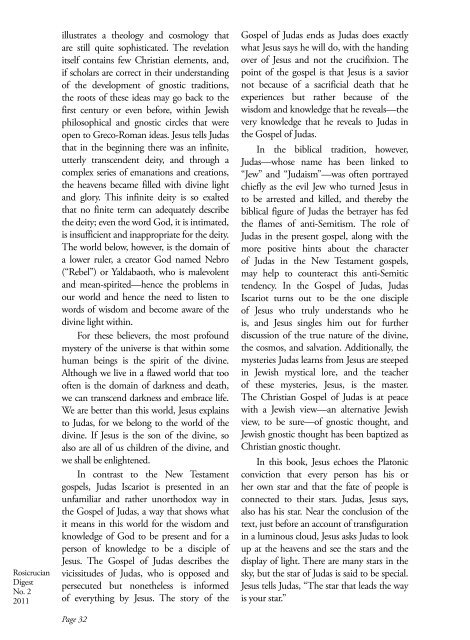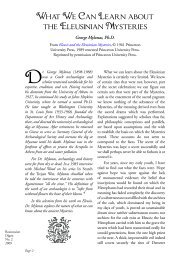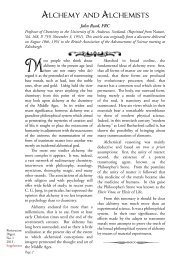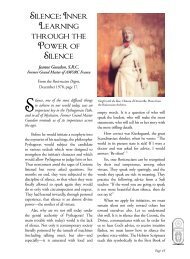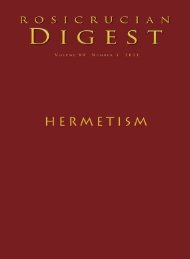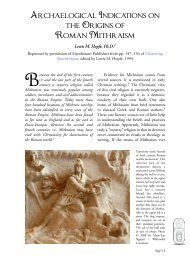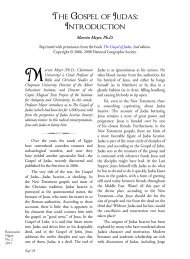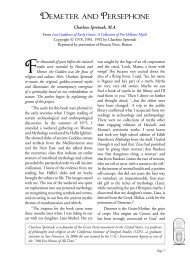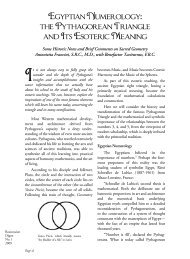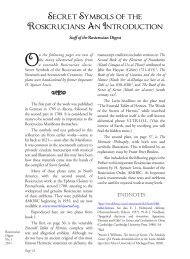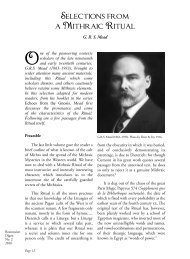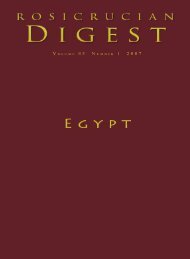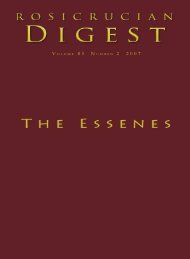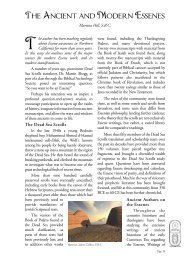Rosicrucian Digest Vol 89 No 2 2011 Gnosticism - Rosicrucian Order
Rosicrucian Digest Vol 89 No 2 2011 Gnosticism - Rosicrucian Order
Rosicrucian Digest Vol 89 No 2 2011 Gnosticism - Rosicrucian Order
You also want an ePaper? Increase the reach of your titles
YUMPU automatically turns print PDFs into web optimized ePapers that Google loves.
<strong>Rosicrucian</strong><br />
<strong>Digest</strong><br />
<strong>No</strong>. 2<br />
<strong>2011</strong><br />
illustrates a theology and cosmology that<br />
are still quite sophisticated. The revelation<br />
itself contains few Christian elements, and,<br />
if scholars are correct in their understanding<br />
of the development of gnostic traditions,<br />
the roots of these ideas may go back to the<br />
first century or even before, within Jewish<br />
philosophical and gnostic circles that were<br />
open to Greco-Roman ideas. Jesus tells Judas<br />
that in the beginning there was an infinite,<br />
utterly transcendent deity, and through a<br />
complex series of emanations and creations,<br />
the heavens became filled with divine light<br />
and glory. This infinite deity is so exalted<br />
that no finite term can adequately describe<br />
the deity; even the word God, it is intimated,<br />
is insufficient and inappropriate for the deity.<br />
The world below, however, is the domain of<br />
a lower ruler, a creator God named Nebro<br />
(“Rebel”) or Yaldabaoth, who is malevolent<br />
and mean-spirited—hence the problems in<br />
our world and hence the need to listen to<br />
words of wisdom and become aware of the<br />
divine light within.<br />
For these believers, the most profound<br />
mystery of the universe is that within some<br />
human beings is the spirit of the divine.<br />
Although we live in a flawed world that too<br />
often is the domain of darkness and death,<br />
we can transcend darkness and embrace life.<br />
We are better than this world, Jesus explains<br />
to Judas, for we belong to the world of the<br />
divine. If Jesus is the son of the divine, so<br />
also are all of us children of the divine, and<br />
we shall be enlightened.<br />
In contrast to the New Testament<br />
gospels, Judas Iscariot is presented in an<br />
unfamiliar and rather unorthodox way in<br />
the Gospel of Judas, a way that shows what<br />
it means in this world for the wisdom and<br />
knowledge of God to be present and for a<br />
person of knowledge to be a disciple of<br />
Jesus. The Gospel of Judas describes the<br />
vicissitudes of Judas, who is opposed and<br />
persecuted but nonetheless is informed<br />
of everything by Jesus. The story of the<br />
Page 32<br />
Gospel of Judas ends as Judas does exactly<br />
what Jesus says he will do, with the handing<br />
over of Jesus and not the crucifixion. The<br />
point of the gospel is that Jesus is a savior<br />
not because of a sacrificial death that he<br />
experiences but rather because of the<br />
wisdom and knowledge that he reveals—the<br />
very knowledge that he reveals to Judas in<br />
the Gospel of Judas.<br />
In the biblical tradition, however,<br />
Judas—whose name has been linked to<br />
“Jew” and “Judaism”—was often portrayed<br />
chiefly as the evil Jew who turned Jesus in<br />
to be arrested and killed, and thereby the<br />
biblical figure of Judas the betrayer has fed<br />
the flames of anti-Semitism. The role of<br />
Judas in the present gospel, along with the<br />
more positive hints about the character<br />
of Judas in the New Testament gospels,<br />
may help to counteract this anti-Semitic<br />
tendency. In the Gospel of Judas, Judas<br />
Iscariot turns out to be the one disciple<br />
of Jesus who truly understands who he<br />
is, and Jesus singles him out for further<br />
discussion of the true nature of the divine,<br />
the cosmos, and salvation. Additionally, the<br />
mysteries Judas learns from Jesus are steeped<br />
in Jewish mystical lore, and the teacher<br />
of these mysteries, Jesus, is the master.<br />
The Christian Gospel of Judas is at peace<br />
with a Jewish view—an alternative Jewish<br />
view, to be sure—of gnostic thought, and<br />
Jewish gnostic thought has been baptized as<br />
Christian gnostic thought.<br />
In this book, Jesus echoes the Platonic<br />
conviction that every person has his or<br />
her own star and that the fate of people is<br />
connected to their stars. Judas, Jesus says,<br />
also has his star. Near the conclusion of the<br />
text, just before an account of transfiguration<br />
in a luminous cloud, Jesus asks Judas to look<br />
up at the heavens and see the stars and the<br />
display of light. There are many stars in the<br />
sky, but the star of Judas is said to be special.<br />
Jesus tells Judas, “The star that leads the way<br />
is your star.”


